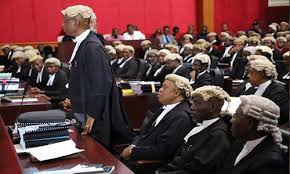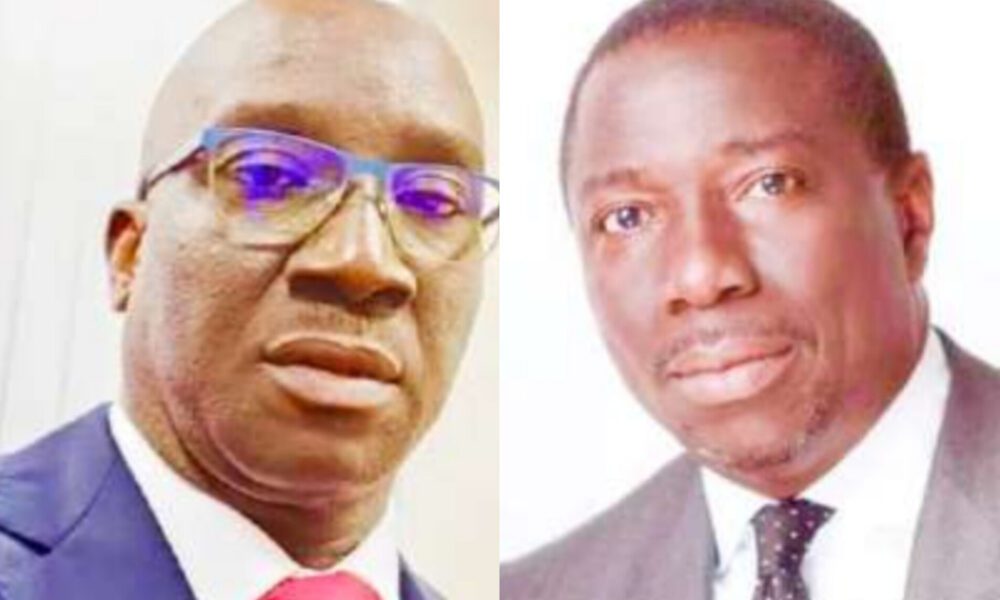By Ehichioya Ezomon
In Nigeria, losers hardly accept their defeat, and virtually every election contest ends at the election petitions tribunal.
To regain their alleged “stolen mandate,” petitioners attempt to exploit loopholes in the laws via technicalities, and not through the so-called rigged processes.
That’s why as fireworks are yet to begin at the Presidential Election Petitions Court (PEPC) against the declaration of Bola Ahmed Tinubu as winner of the February 25, 2023, Presidential Election – parties to the dispute are already preping for appeals to the Supreme Court.
The apex court is the last busstop in Nigeria for election matters; and the May 9 judgment on appeals from the 2022 governorship poll in Osun may serve as a template for the petitions at the PEPC.
That ruling has buoyed, and also dampened the petitioners and respondents’ optimism to get reprieve at the Supreme Court.
The court had weighed in on the centrality of the Bimodal Voters Accreditation System (BVAS) in the transmission of election results.
The five-member panel held that by the Electoral Act 2022, “Instant or on-the-spot transmission of the number of accredited voters in the BVAS to the backend server of INEC is not backed by law.”
Besides, the court affirmed that to prove over-voting in an election, you’ve to present the polling unit BVAS for physical evidence.
The judgment on the Osun poll has reinforced the “pre-eminence” of the Supreme Court as the final arbiter – from which no further appeal lies to question its decision.
Be it a “substantial justice” or a “miscarriage of justice,” parties that submit to arbitration of the Court must accept its final opinion.
This is exemplified by former Governor Adegboyega Oyetola, hours after the Supreme Court ruling stamped his loss of the July 2022 governorship in Osun. In a personal statement, Oyetola said:
“We strongly believe we presented a good case before the Supreme Court but the court thought otherwise and has given its verdict. While the outcome is against our wish and that of our party members and supporters, we are all bound to accept it as law-abiding citizens… To our members and supporters across the state, I urge you all to accept the verdict of the court and move on.”
The late Justice Chukwudifu Oputa stressed the “unquestioned decision” of the Supreme Court when he declared: “We are final not because we are infallible, rather we are infallible because we are final.”
The Oputa declaration rings ominously at the PEPC, especially in regard to some of the cases the Supreme Court has delivered since the return of democracy in 1999.
To critics, the court is viewed as overplaying its judicial activism, and at the same time relying heavily on strict interpretation of the law. Four examples will suffice:
In 2007, the Supreme Court declared Chibuike Rotimi Amaechi as governor-elect of Rivers State even though he didn’t campaign for the position, nor vote at the poll.
The court held that votes belong to the party, and not the candidate. And that Amaechi, having won the PDP primaries, should inherit the votes scored by Celestine Omehia, who replaced him at the poll, and be returned as governor-elect.
In 2019, the Supreme Court invalidated APC’s primaries in Zamfara, and dismissed the party’s governor-elect, deputy governor-elect, and assembly members-elect, and yielded their seats to the defeated PDP candidates.
In Bayelsa in 2021, the Court, on alleged certificate forgery against the APC deputy governor-elect, sacked the governor-elect on the eve of his inauguration, and crowned the defeated PDP candidate as governor-elect.
In 2023, Senate President Ahmad Lawan, who lost his presidential bid – and didn’t participate in the APC senatorial primaries for Yobe North in 2022 – clinched the ticket via a ruling of the Supreme Court.
The court held that Bashir Machina, winner of the primaries, ought to proceed with a “writ of summons,” and not an “originating summons,” as his fraud allegation against the APC needed to be corroborated by sworn witnesses.
Still, the Supreme Court has had cause to warn against over-reliance on technicalities to shut out litigants from being heard on the merit of their cases.
Ebun-Olu Adegboruwa (SAN), in a piece on “The evils of technical justice” (SaharaReporters of February 2, 2021), referenced the case of Boniface Ebere Okezie & 3 Ors. v. Central Bank of Nigeria & 5 Ors. (2020) 15 NWLR (Pt.1747) 181 – that trasversed the judicial road for 11 years (2009-2020).
The Plaintiffs filed an originating summons, setting out their claims in “declarations, injunctive reliefs and damages,” without questions for determination. The defendants objected to the writ as meritless, and the court lacking the jurisdiction to hear the case.
Both the High Court and Appeal Court sustained the preliminary objection by the defendants, but the Supreme Court reversed their decisions, and “took out time to define the role of the judiciary, in very clear terms,” thus:
“The paramount duty of courts is to do substantial justice and not cling to technicalities that will defeat the ends of justice. It is more in the interest of justice that parties are afforded reasonable opportunity for their rights to be investigated and determined on merit rather than that parties be shut out prematurely from being heard on the grounds of non-substantial compliance with rules of court.
“It is immaterial that there are technicalities arising from statutory provisions, or technicalities inherent in rules of court. So long as the law or rule has been substantially complied with and the object of the provisions of the statute or rule is not defeated, and failure to comply fully has not occasioned a miscarriage of justice, the proceedings will not be nullified.”
But in the earlier cited cases, the Supreme Court side-tracked substance, and relied on technicalities to deny the poll winners, and allow the losers to reap “where they did not sow.”
Hence, the anxiety in the APC and President-elect Tinubu’s camp, as the petitions at the PEPC have the coloration of cases decided by the Supreme Court in recent times.
As allegations of election fraud are difficult to prove “beyond all reasonable doubts,” petitioners at the PEPC have placed heavy weather on technicalities, rather than the substance of the votes cast at the February 25 poll.
Thus, the petitioners make light of the charge of rigging, and zero in on “soft targets” to disqualify the President-elect, or cancel or annull the poll. The petitioners’ claims:
1) That Tinubu’s forged birth, education and job records, swears on oath, and commits perjury.
2) Convicted for narcotics and money laundering, he forfeited $460,000 to the U.S. government.
3) He’s dual citizenship: Nigeria and Guinea, in breach of provisions of the 1999 Constitution.
4) Shettima was nominated for two elective positions in the 2023 poll cycle, in violation of provisions of the Electoral Act 2022.
5) INEC violated the Act, and its own regulations and guidelines by failing to transmit the presidential results via the BVAS onto the INEC Results Viewing (IReV) portal.
On March 1, INEC declared that Tinubu of the APC won the poll with 8,794,726 votes, while Atiku Abubakar of the PDP and Peter Obi of Labour Party scored 6,984,520 votes and 6,101,533 votes, as first and second runners-up.
Five of 17 defeated candidates and their parties had filed petitions at the PEPC, to upturn the INEC declaration, but two petitions had been withdrawn, and dismissed.
Atiku and Obi claim to win the election, pray the court to return them elected, or cancel (or annull) the poll, and conduct a fresh one between Tinubu and Atiku, as top scorers; or between Atiku and Obi if Tinubu’s disqualified, as Obi canvasses.
Atiku and Obi argue that the allegations against Tinubu, and rigging of the poll by the APC have unqualified Tinubu for President, and the votes cast for him are wasted, and his declaration as President-elect null and void.
Yet, many in the opposition have expressed worries that the pre-hearings at the PEPC are coming midway into the 180 days allotted for disposal of petitions.
But to uphold the dictum of justice delayed is justice denied, the PEPC has advised counsel to, “avoid unnecessary technicalities.”
Chairman of the five-member panel, Justice Haruna Tsammani, said: “Election is time bound, let us not waste unnecessary time, let us cooperate with each other so that everyone will leave here satisfied.”
“We are determined to look at all the matters brought before us. Let us look at what is good for our country and avoid time-wasting applications.”
The tribunal’s advice is timely in that election is sui generis (of its own kind, in a class by itself, or unique) from ordinary legal issues.
Lawyers take undue advantage of the unusualness of poll matters to file “frivolous applications” – based on technicalities – in attempts to sway or slow down proceedings.
For now, the PEPC, and Supreme Court are under the spotlight, to deliver substantial justice, and not “technical justice” that erodes the substance of matters before them!
Mr Ezomon, Journalist and Media Consultant, writes from Lagos, Nigeria





